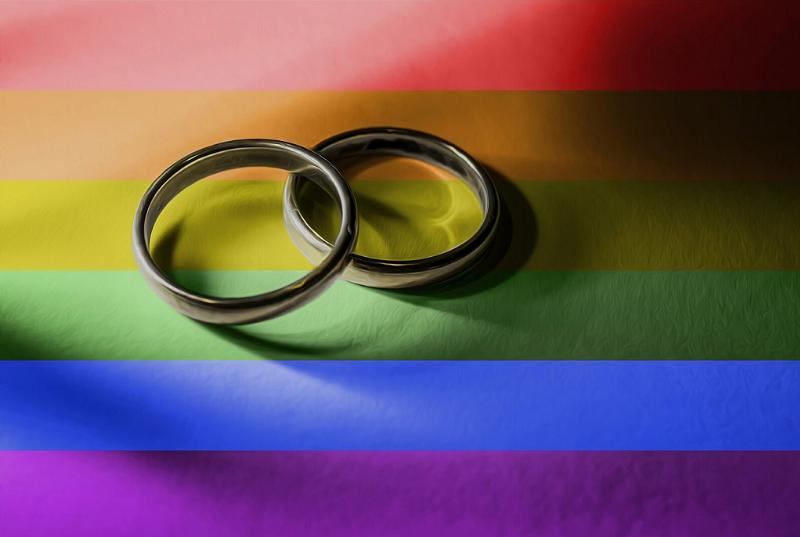


On a podcast called “Raging Moderates,” Hillary Clinton recently said, “The Supreme Court will hear a case about same-sex marriage. My prediction is they will do to gay marriage what they did to abortion. They will send it back to the states.” This is one time that you can’t say, of the onetime Goldwater Girl, “What’s she been smoking?”
SCOTUS has a chance to overrule Obergefell v. Hodges, in a case that it might or might not take this term (although chances are it won’t). Whether this term or some future term, the justices, along with the public, need to accurately apprehend the logical lay of the land.
It looks like this: If same-sex couples are similarly situated to opposite-sex couples, then (as in Obergefell) state laws banning same-sex civil marriage should be struck down; conversely, if same-sex and opposite-sex couples are not similarly situated, then state laws, or legislation by Congress, that requires recognition of same-sex civil marriage should be struck down (note that there’s no equal-protection right to destroy marriage).
The logic of this is actually the best practical reason for overruling Obergefell. The question of whether same-sex and opposite-sex couples are similarly situated with respect to marriage is an apparently irresolvable disagreement. We likely even disagree about whether it’s theoretically irresolvable because we have fundamentally different moral and metaphysical beliefs, or only irresolvable in practice. In any case, constitutional-law deciders have no choice but to muddle through, and this means letting the respective state legislatures have the final say on whether to recognize same-sex marriage in their states.
That’s how it should be. Marriage has traditionally, and rightly (by virtue of the principle of subsidiarity), been viewed as the province of the states. Marriage is a matter of federal civil rights except when it isn’t. The difference between Obergefell and Loving v. Virginia is that the former, but not the latter, contradicts marriage as the social institution that centrally involves procreation. Claims of civil rights, in the context of marriage, can hardly ignore that sexual complementarity is a sort of metaphysically basic fact, unlike the skin color at issue in Loving.
 SCOTUS should avoid absolutism on either end. That means overruling Obergefell. Any argument to the effect that it’s too late to do that now because many opposite-sex couples are already married (on the podcast, Hillary encouraged more of them to get married pronto), requires that it be true to say opposite-sex and same-sex couples are similarly situated with respect to marriage. It’s not even presumptively true. Indeed, if anything’s presumptively true in this case, it’s that same-sex and opposite-sex couples are not similarly situated, since same-sex couples are by nature unable to procreate.
SCOTUS should avoid absolutism on either end. That means overruling Obergefell. Any argument to the effect that it’s too late to do that now because many opposite-sex couples are already married (on the podcast, Hillary encouraged more of them to get married pronto), requires that it be true to say opposite-sex and same-sex couples are similarly situated with respect to marriage. It’s not even presumptively true. Indeed, if anything’s presumptively true in this case, it’s that same-sex and opposite-sex couples are not similarly situated, since same-sex couples are by nature unable to procreate.
The only seemingly plausible prospect of making it true (or at least presumptively true) that same-sex and opposite-sex couples are similarly situated is to suppose that genetic cloning is normative for human identity. This just shows how much trouble the proponents of same-sex marriage are in.
It gets worse. Those who believe marriage is about love as opposed to procreation (with love presumably procreation’s cousin) surely won’t deny that procreation is relevant to the institution of marriage, and this unavoidably undermines their claim that same-sex and opposite-sex couples are similarly situated. Maybe such couples are indeed similarly situated with respect to love. So what? Marriage isn’t only about love.
In light of all that, compare same-sex marriage with abortion. Abortion doesn’t present a polarity (or dialectic) of right results like the one in the same-sex marriage scenario. There’s no abortion analogue to similar-situatedness. Personhood isn’t a good analogue because, for one thing, the “future-like-ours” case against abortion is a powerful argument that doesn’t rely on zygotes, embryos, or fetuses being persons. Thus, same-sex marriage is an even more clear-cut matter than abortion for being something that the states should decide for themselves. Given the possession of a future-like-ours by the unborn, it doesn’t follow that the Supreme Court should strike down all legislation or lower court decisions banning abortion, even if the undoubtedly best philosophical argument is that the unborn aren’t persons. This points to a significant disanalogy with the same-sex marriage case. It also shows how, overall, social conservatives are apparently in a stronger philosophical position than social liberals.
It’s true that same-sex couples who get married in California, say, and who want to move to Kansas, will inevitably be burdened when Kansas doesn’t recognize their marriage. But that’s what happens when marriage cannot be a natural imperative for same-sex couples, as opposed to a social or psychological imperative. Homosexuals must simply accept the practical and legal constraints that come with the fact that nothing will ever make homosexuality as normative as heterosexuality.
Two indirect implications of this analysis should give liberals pause. First, liberal legal scholars are misguided in insisting that judges must always look to “values.” Suppose John Roberts, Neil Gorsuch, and Brett Kavanaugh believe that same-sex and opposite-sex couples aren’t similarly situated. Should they therefore join the other conservatives, who doubtlessly believe that, in striking down state laws, or legislation by Congress, recognizing same-sex marriage? Such a result would, after all, be compelled by their “values,” or rather their basic beliefs about what the world is like.
Second, think of the problem that’s created for the idea that legal non-recognition of same-sex marriage is a form of gender discrimination: “Bob’s of course allowed to marry Sue, so why on earth shouldn’t he also be allowed marry Tommy, if he so chooses?” The claim is that if Bob can’t legally marry Tommy as readily as he can marry Sue, he’s being discriminated against on account of his gender. The issue of the similar-situatedness of couples shows -- with a clarity that’s hard to miss -- why this argument is specious, and why it should be laughed out of court.
Regardless of what SCOTUS does, we can feel pretty good right now. For a long time, we could be forgiven for thinking America was in a state of advanced decay. It doesn’t look that way now. Mind you, this country has a lot of problems. But, very happily, gender wokism might not continue to be the most unnecessary and hare-brained of those problems.
All it takes is a little federalism, where appropriate.
Image: ** RCB **
